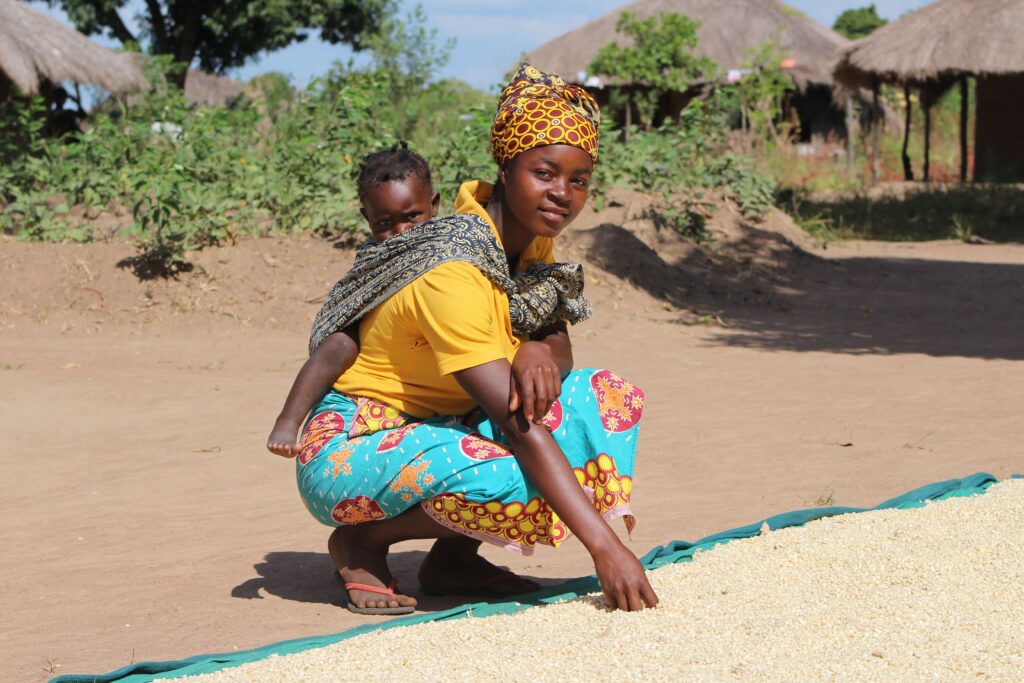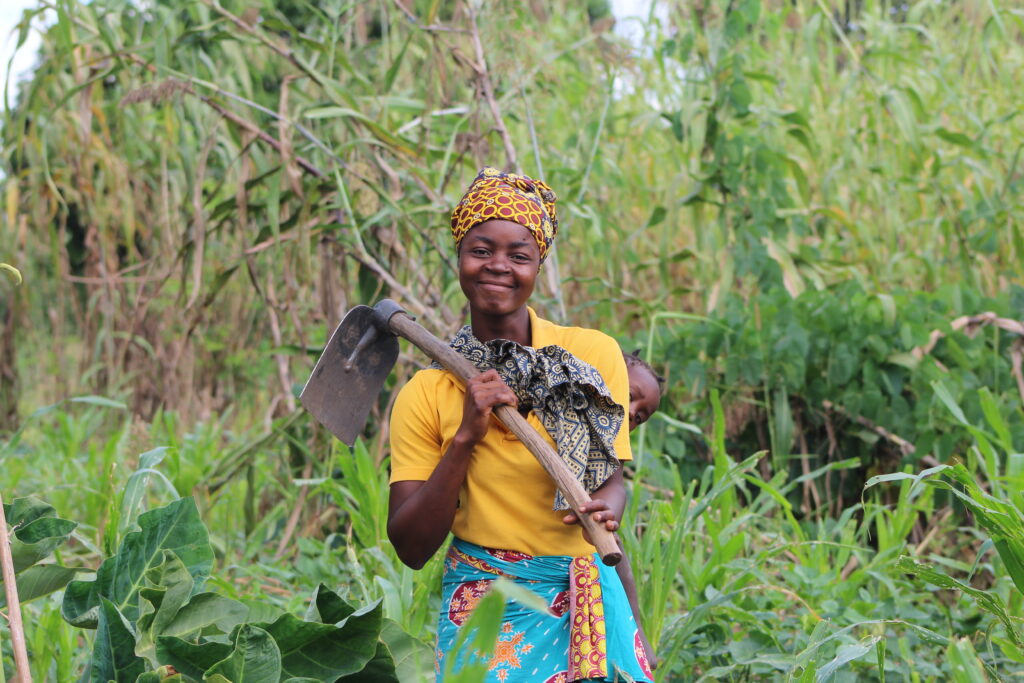Many people in Mozambique suffer from extreme poverty and the consequences of natural disasters. Cyclones, floods and droughts have increased significantly in recent years. In our project, we teach young people about environmentally friendly, agroecological agriculture. This also secures their livelihoods. A field report by our Mozambique program coordinator, Hafid Derbal.
In May 2023, I had the opportunity to visit the project that we are implementing together with our partner organization NANA in Zambezia, a province in northern Mozambique. There, we support young farmers in the surrounding area of the rural town of Mocuba. During my visit, I met some impressive people, including Margarida Rafael, a 20-year-old farmer. Margarida has benefited from further training in cultivation and livestock farming. In a country like Mozambique, which is one of the poorest in the world, such opportunities are crucial to free young people from the spiral of poverty.
Margarida lives with her two children (10 months and 3 years) in Lissava, a small rural community two hours' walk from Mocuba. Like many other young MozambicansInside, Margarida also has to look after her children alone. Her father disappeared shortly after the birth of her second child. She lives with her mother, two siblings and her two children. "My uncle died a few years ago. That was very difficult because we lived off his money." Like Margarida's family, many families in Mozambique live on a single salary. Two thirds of Mozambicansinside earn just under two dollars a day. Margarida's uncle was one of the few who had a formal income and, as is usual in Mozambique, he not only provided for his household, but also for his sister's household. Margarida's uncle also financed Margarida's training as a nurse. When he died, she had to drop out and work in the fields.
Increasing climate catastrophes
Agriculture continues to play a crucial role in economic development and poverty reduction in Mozambique. Agricultural production is mainly carried out in the family sector for small producers using labor-intensive technologies on small farms with weak links to the markets. The climate crisis is particularly devastating in such a context, as Mozambique is the country most affected by climate change worldwide, with the number of tropical cyclones in particular having a massive impact.
Jorge Manuel Cardoso, the director of our partner organization NANA, knows this too. "Climate disasters have become more frequent in recent years. Either the cyclones bring too much rain and destructive winds or it stays dry for too long. That's why it's important to equip young farmers with the knowledge they need to grow crops and protect their fields as best they can."

Although cyclones are part of the Indian Ocean weather pattern, their frequency and strength have increased significantly in recent years. Much of Mozambique lies in the lowlands and cyclones usually sweep inland with full force. When I visited Lissava, the signs of the devastation of fields and houses from Cyclone Freddy in March 2023 were still clearly visible. And although the causes of climate change are not to be found in Mozambique, the people have to absorb the full consequences. Margarida and her family are no exception: "Our entire harvest was lost two months ago. Our home is still standing and my children are doing well, but it was difficult to get clean water and food. Fortunately, the people from NANA were there." Our partner organization benefits greatly from its good network in the communities, as it has been working in Zambezia since 1998 and enjoys the trust of the people and authorities. This helps them to react quickly and effectively in crisis situations. For Jeremias Gabriel Benjamim, agricultural economist and project manager at NANA, the work must go far beyond this and strengthen the resilience of young people: "The people here are usually ill-prepared for the severity and frequency of climate disasters. They don't have enough supplies or savings. There is hardly any state protection. In this context, it is important to familiarize young people with climate-friendly farming methods, but also to better prepare them for crises."
Further training, seeds, coaching
That is why we not only help to alleviate people's suffering afterwards. With our work, we also offer further training on agroecological cultivation and fertilization methods, distribute seeds and conduct coaching sessions. Market analyses are carried out together with the young farmers to make the profit from cultivation profitable. Margarida has also been able to significantly increase her income: "I can now sell my harvest at the market three times a week. The most popular crops are beetroot, rice, beans, maize, peanuts and much more. I earn around 15 US dollars per sale. We eat part of the harvest ourselves. I also help my mother and siblings with my earnings."
In focus: women's rights
Because young women in Mozambique struggle with inequality of opportunity, this issue is particularly important. Elisia Francisco Suriar, agricultural economist and gender officer at NANA, says: "Girls and women are particularly affected by poverty here. Women are disadvantaged in their access to land and other natural resources. Although national laws state that women and men have equal access to land, women can only access land through a male relative due to customary land tenure systems." Furthermore, access to credit is a major problem for smallholder farmers. The resulting low incomes not only jeopardize the food security of families, but also diminish educational prospects and thus create a vicious circle of poverty. It is precisely this cycle that we are trying to break with our offers for young people.
Margarida has big plans: "I want to resume my training as a nurse. That will take some time, but now that I can better predict my income, I have a plan for how I will get there in a few years' time. The next crisis is bound to come, but I'm prepared now."


